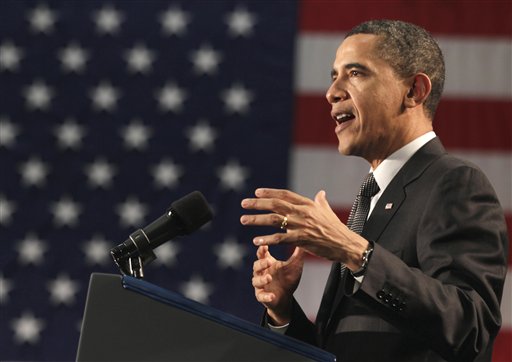CLEVELAND (AP) — Twenty months ahead of the 2012 election, President Barack Obama is traveling the nation, vying for the public’s attention one state at a time, while international crises and budget fights compete with his plans for economic revival.
On Tuesday, Obama curried favor with small businesses in politically important Ohio, pushing his plans to boost American competitiveness by increasing spending on sectors like education and infrastructure. That agenda, however, is running up against opposition from some Republican governors in cash-strapped states, and GOP lawmakers on Capitol Hill, whose demands for deep spending cuts raise the prospect of a federal government shutdown.
The president’s domestic initiatives have also been overshadowed by the turmoil in the Middle East. Tuesday’s trip came amid an escalation of violence in Libya, where government-backed security forces clashed with protesters, and news that four Americans were killed at the hands of pirates off the coast of Africa.
Since his State of the Union address last month, Obama has traveled away from Washington at least once a week, mostly stopping in political battleground states that will be crucial to his re-election bid, including Wisconsin, Michigan and Pennsylvania. He plans a trip to Florida next week.
As was the case during the 2008 campaign, Obama aides are willing to forego national media headlines in favor of mostly positive coverage in local media outlets in regions the president visits. They’re also courting the press in swing states even when Obama is not on the road, inviting reporters from local television stations in Virginia, Wisconsin and Ohio to the White House for interviews last week.
Keeping with his pledge to focus more on jobs following his party’s sweeping defeats in the midterm elections, Obama’s message to swing state voters is strictly economic. He’s touting cuts to some domestic programs in his proposed budget as a way to bring down the deficit, while also citing the need for increased spending on education, infrastructure and research as a way to boost job growth and help the country compete in the global economy.
“By cutting back on what we don’t need, we can invest in the future. We can invest in the things that are critical to our long-term success,” Obama said Tuesday to more than 100 small business leaders gathered at Cleveland State University.
However, Obama’s calls for increased spending run counter to the deep budget cutting steps being taken by governors in Wisconsin, New Jersey, Indiana and Ohio, where Gov. John Kasich is backing state legislation that would end collective bargaining for public employees. Kasich greeted Obama at the airport Tuesday upon his arrival in Cleveland.
Supporters of the Ohio bill, as well as a similar measure backed by Wisconsin Gov. Scott Walker, say the measures would help control spending and provide cash-strapped states greater flexibility.
Opponents of the bill were expected to protest in Ohio’s capital Tuesday. Similar protests in Wisconsin have attracted national attention, and Obama himself waded into the dispute last week by arguing that limiting bargaining rights “seems like more of an assault on unions.”
Obama also faces budget battles back in Washington, where the lawmakers are debating a bill to fund the government through Sept. 30. The Republican-led House passed a bill early Saturday that cuts $61 billion for hundreds of federal program. Though the bill faces longer odds in the Senate, Obama has threatened a veto should the measure land on his desk.
If no compromise over the budget is reached by March 4, parts of the government could shut down.
Obama has said the drastic cuts could cause the still fragile economic recovery to stale, and make it harder for small business owners, like the ones he spoke to in Cleveland, to access capital and hire new workers.
“It’s small businesses like your that help drive America’s economic growth,” Obama said Tuesday. “When our small businesses do well, then America does well.”
Administration officials also plan to hold additional forums with small business owners across the country. Sessions are planned for Atlanta, Boston, Pittsburgh, Minneapolis and Silicon Valley as well as Austin, Texas; Durham, N.C., and Boulder, Colo.
___
Associated Press writers Julie Pace and Jim Kuhnhenn in Washington contributed to this report.








